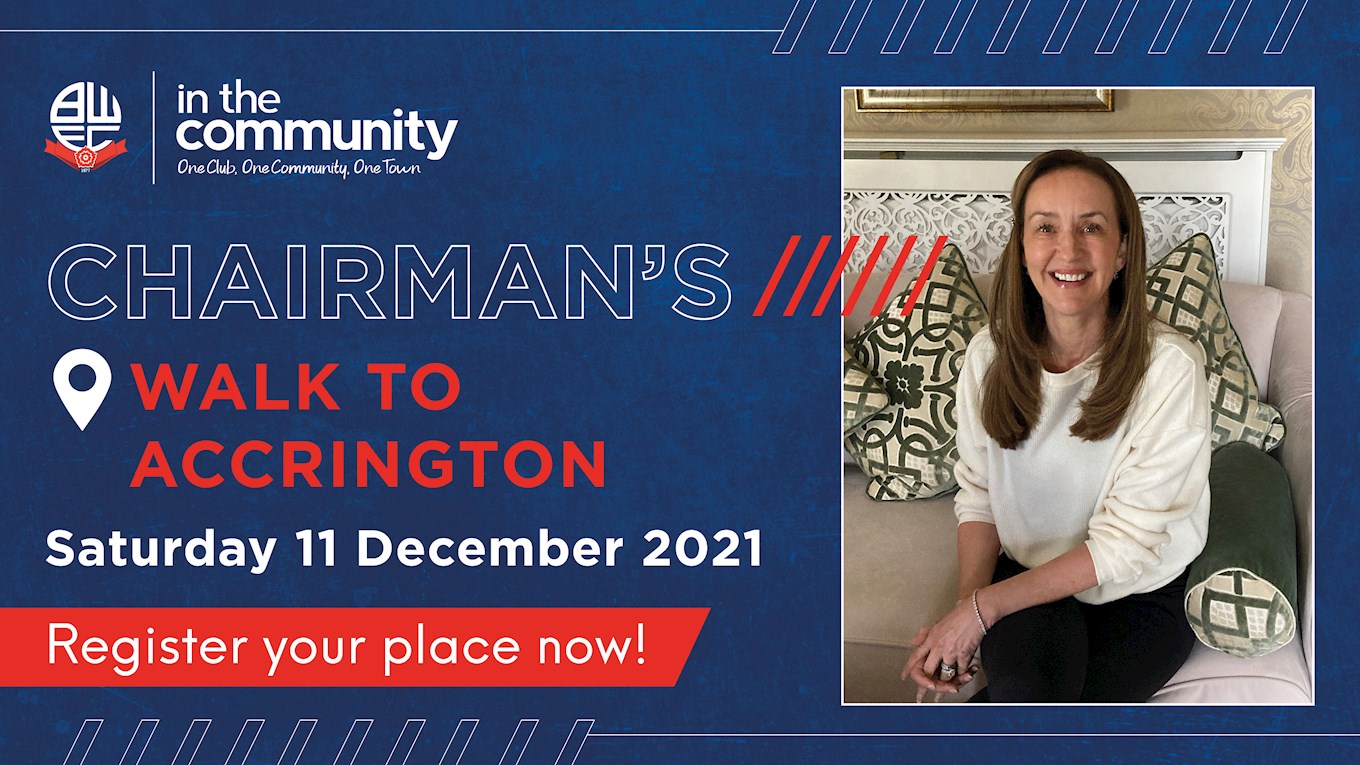Chairman Sharon Brittan is to lead a group of fundraisers on a walk from Bolton Wanderers to Accrington Stanley to raise money to enhance Bolton Wanderers in the Community’s mental health provision – and she wants you to join her.
With BWFC Director Nick Luckock and CEO Neil Hart already committed to joining Sharon, the event on Saturday 11 December will see willing volunteers journey 20 miles north with the aim of arriving in time to watch the Wanderers take on Stanley. Every penny raised will go towards supporting frontline community mental health provision in Bolton.
Club Chairman Sharon Brittan said: “The pandemic changed all of our lives for so many different reasons and we now know one of the serious consequences of lockdown is the toll it’s taken on people’s mental health.
“BWitC’s mental health provision is addressing this directly, reaching out into the Bolton community to offer crucial support. They are working with those hit the hardest by the events of the past 18+ months, including people who are unemployed, suffering from addiction and isolated senior citizens.
“I hope as many fans as possible will join me and together we can raise vital funds for those who most need our help.”
BWitC’s mental health provision provides a myriad of support for people from across the communities in Bolton.
Richard Slater, Health and Disability Manager for Bolton Wanderers in the Community, said: “Over the last 18 months we have seen the number of people experiencing poor mental health in our community, and across the country, increase dramatically with heightened risk factors such as unemployment, poverty, debt and widening inequalities.
“At BWitC, we have identified and prioritised our mental health work as we come out of the pandemic and we look to help those members of our Bolton community that need it.”
Event details:
The Walk to Accrington will take place on Saturday 11 December, ahead of Bolton Wanderers’ away fixture at Accrington Stanley on the same day. Fundraisers will gather at the University of Bolton Stadium at 6.30am, with a departure time of 7am.
The walk is 20 miles and is estimated to take around six to seven hours. The aim is to arrive at the Crown Ground for approximately 2pm, ahead of kick off an hour later.
Places cost £25 and fundraisers are asked to raise a minimum of £200 to take part. The price of registration includes an away ticket to the Accrington Stanley v Wanderers fixture.
The Walk to Accrington event is designed to be a significant challenge. Therefore, Bolton Wanderers in the Community advise that those who wish to take part possess a reasonable level of fitness.
Fans who would like to take on the challenge can register their place here.
For more information, please contact Jonathan Mills on jmills@bwitc.org.uk.
BWitC’s mental health projects:
Team Talk is a mental health project designed to provide a ‘safe space’ for men to talk and aims to offer a support network for those who may need additional support. Open to men aged 18+, the sessions enable conversations to be had around mental health. Topics are covered in an informal setting and include coping mechanisms, peer to peer support, and recognising triggers. Participants are often able to connect through a common interest in football and Bolton Wanderers.
Mental Health Football offer weekly sessions for those who have experienced mental health issues or are who are currently living with them. Participants may be long term unemployed, at risk of offending/re-offending and recovering from substance/alcohol misuse. The sessions provide opportunities for these men to take part in physical activity whilst feeling connecting through peer to peer support. These sessions are also a great opportunity to develop confidence and self-esteem.
Extra Time Hub works with male and female adults aged 55+ and aims to reduce isolation and develop social wellbeing. This is done through a physical activity offer of group walks, allotment access, yoga and strength & balance sessions as well as opportunities for social gatherings at the University of Bolton Stadium. The Extra Time project now also looks to reduce the risk factors for mental health issues that have been heightened by the pandemic including loneliness and isolation, poor access to outdoor and green spaces and widening inequalities

